25 years of the Belfast/Good Friday Agreement in Northern Ireland
The Belfast/Good Friday Agreement, signed on 10 April 1998, was a historic achievement. CMI – Martti Ahtisaari Peace Foundation, together with the Embassy of Ireland in Finland, the British Embassy Helsinki and the Ministry for Foreign Affairs of Finland, organised a seminar to mark 25 years of the agreement. It was an opportunity to reflect on the long-term process of peace, the role of women and youth, the legacy of the Agreement, and Finland’s contribution to the peace process.
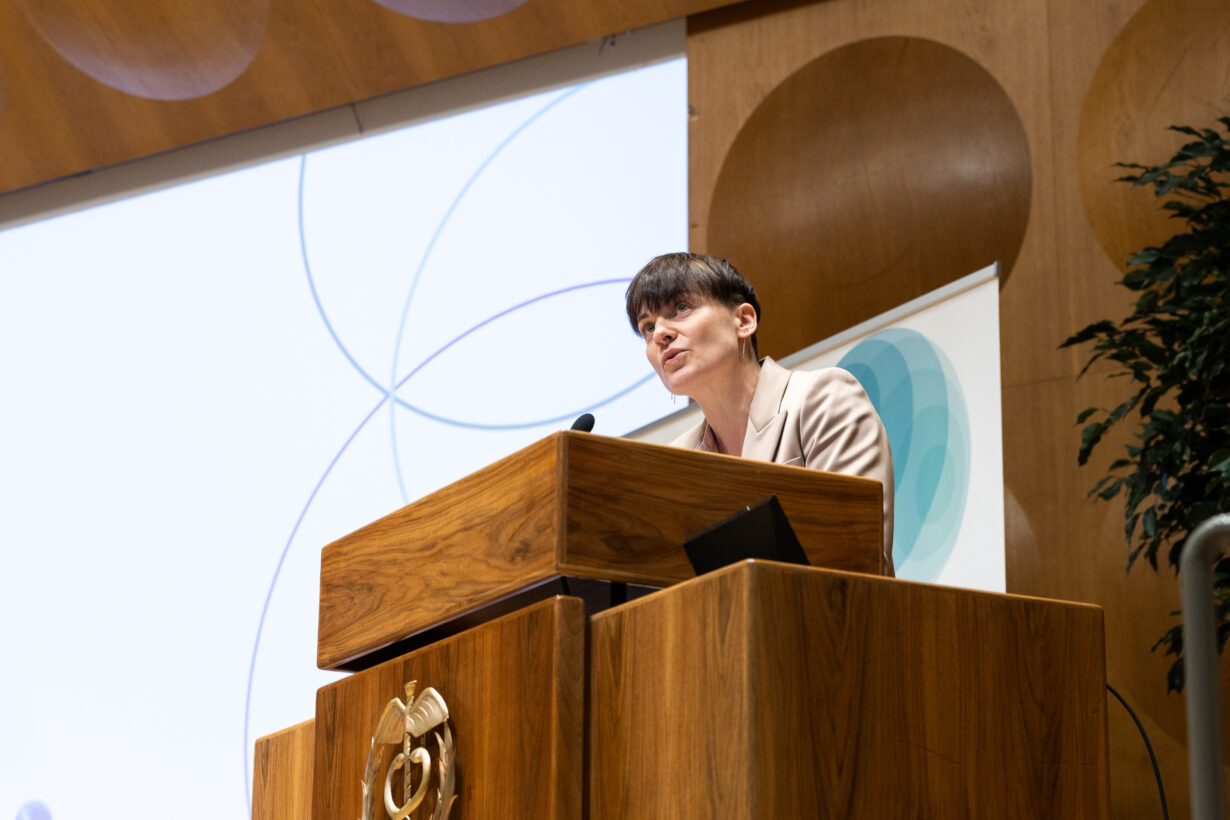
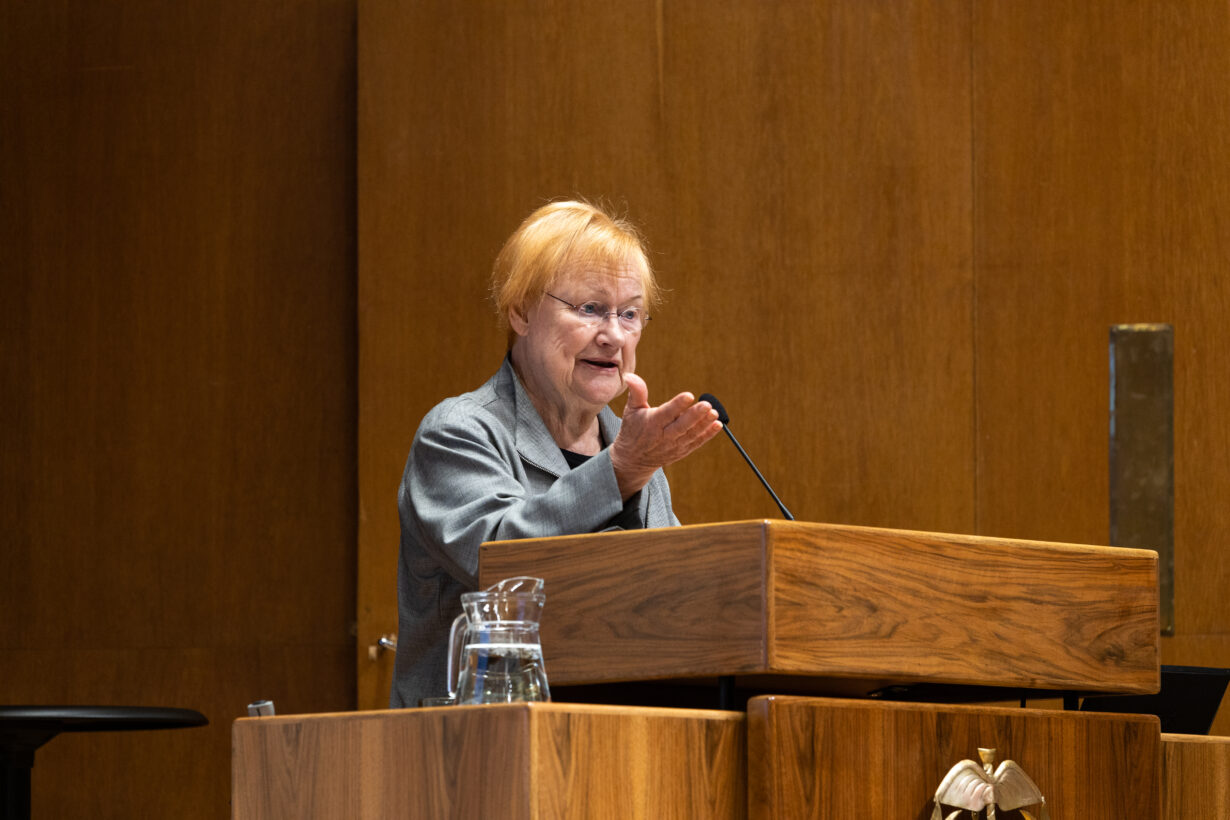
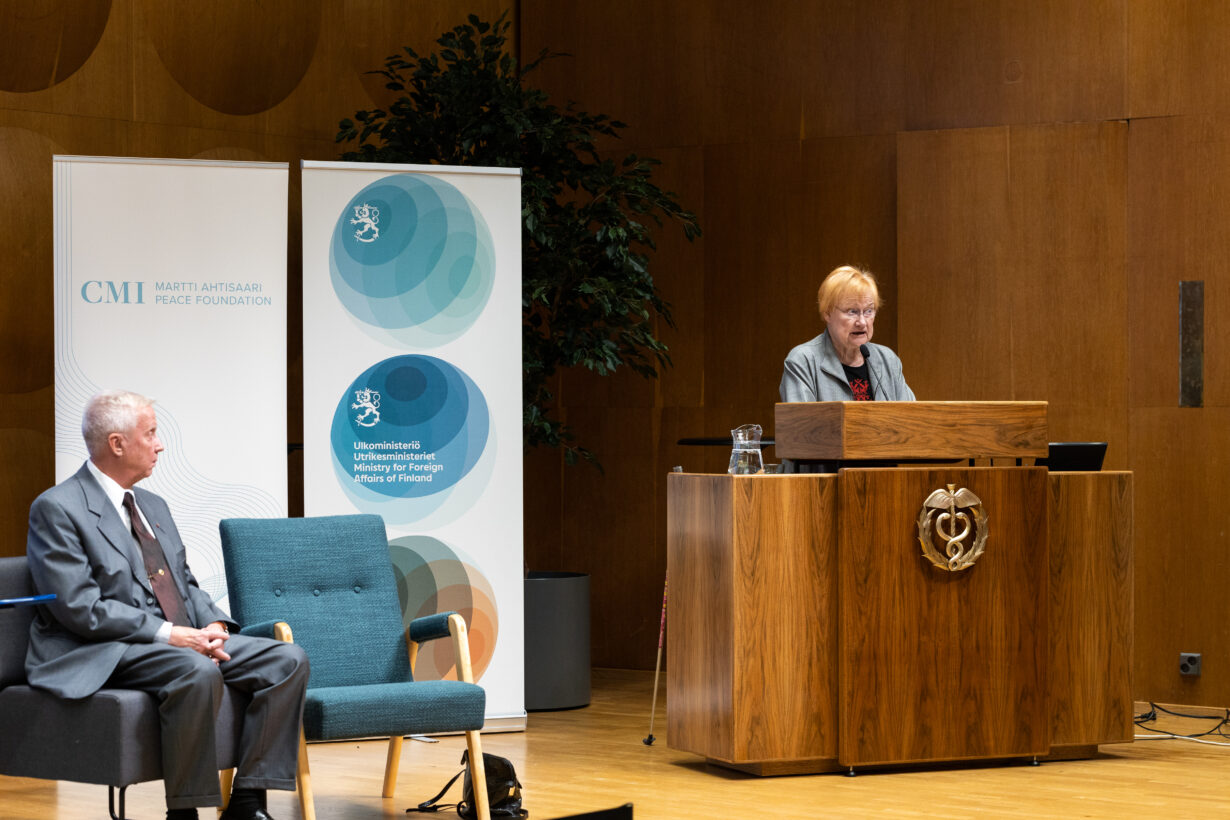
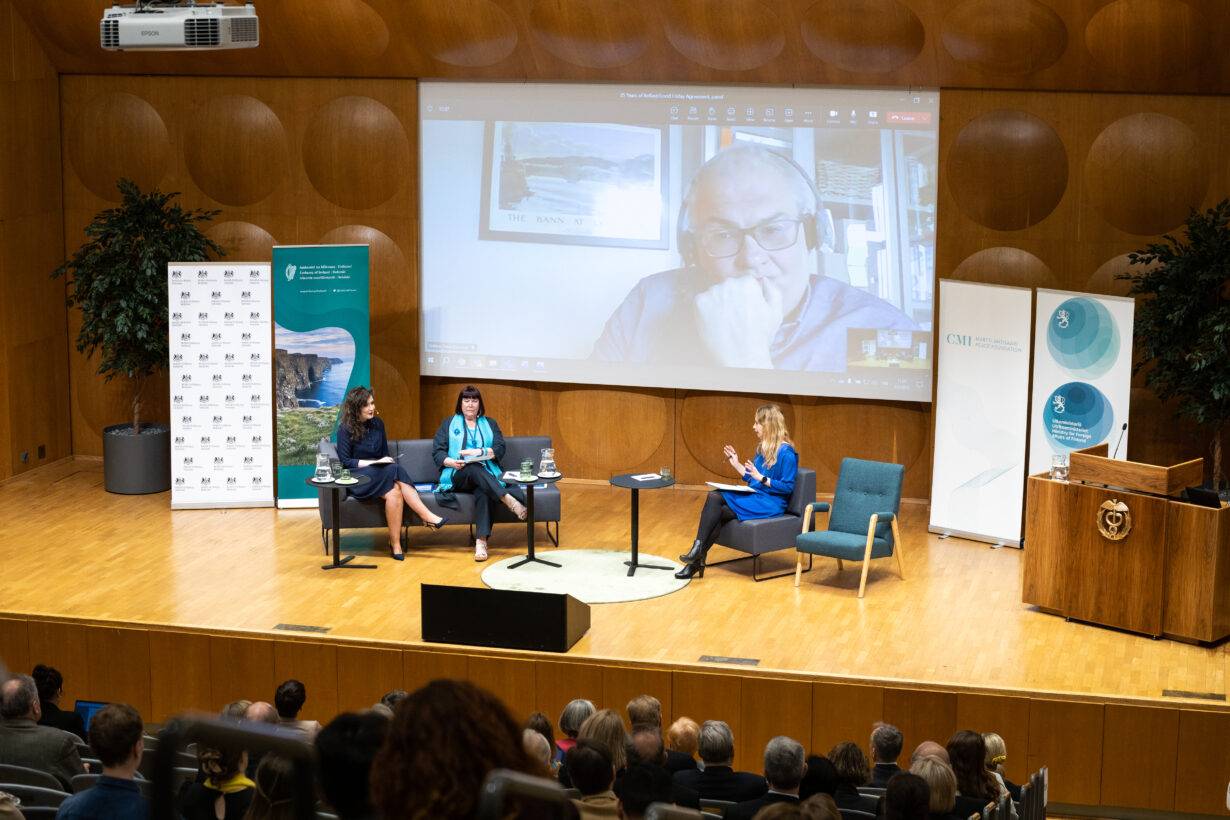
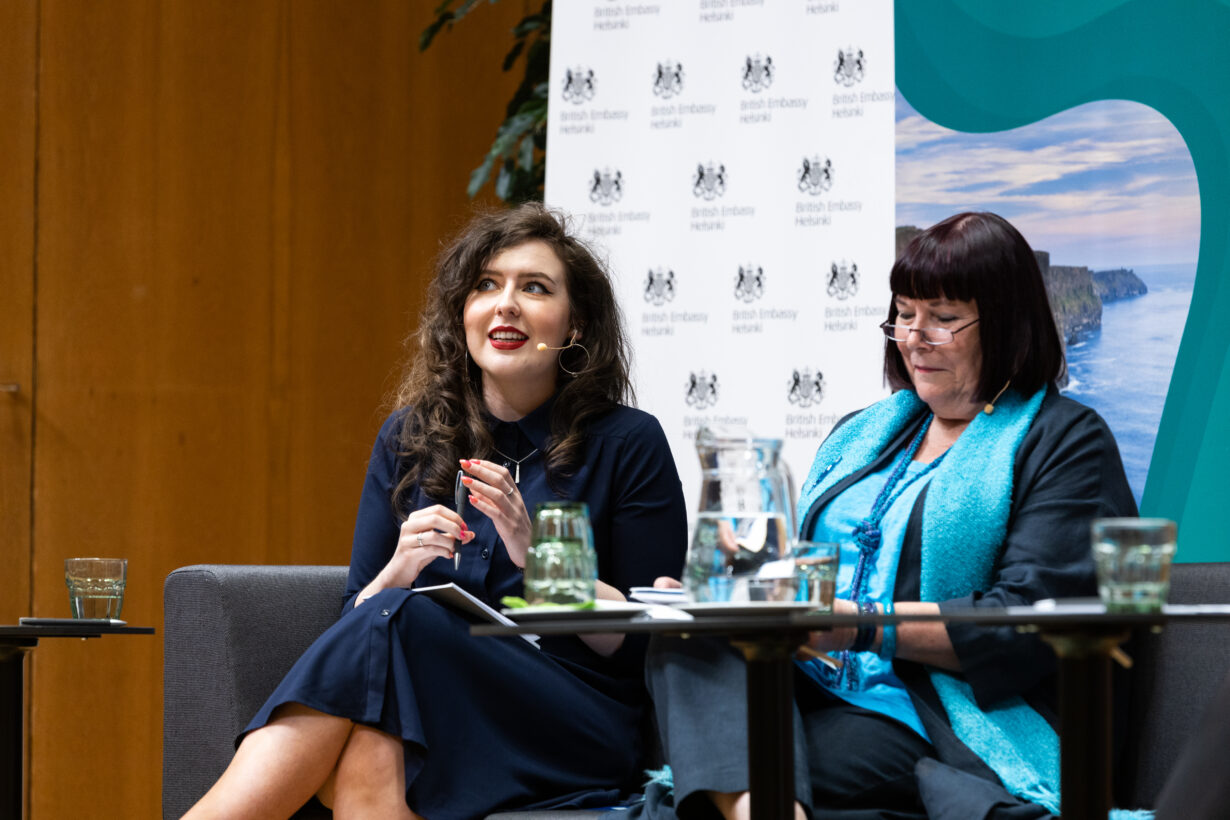
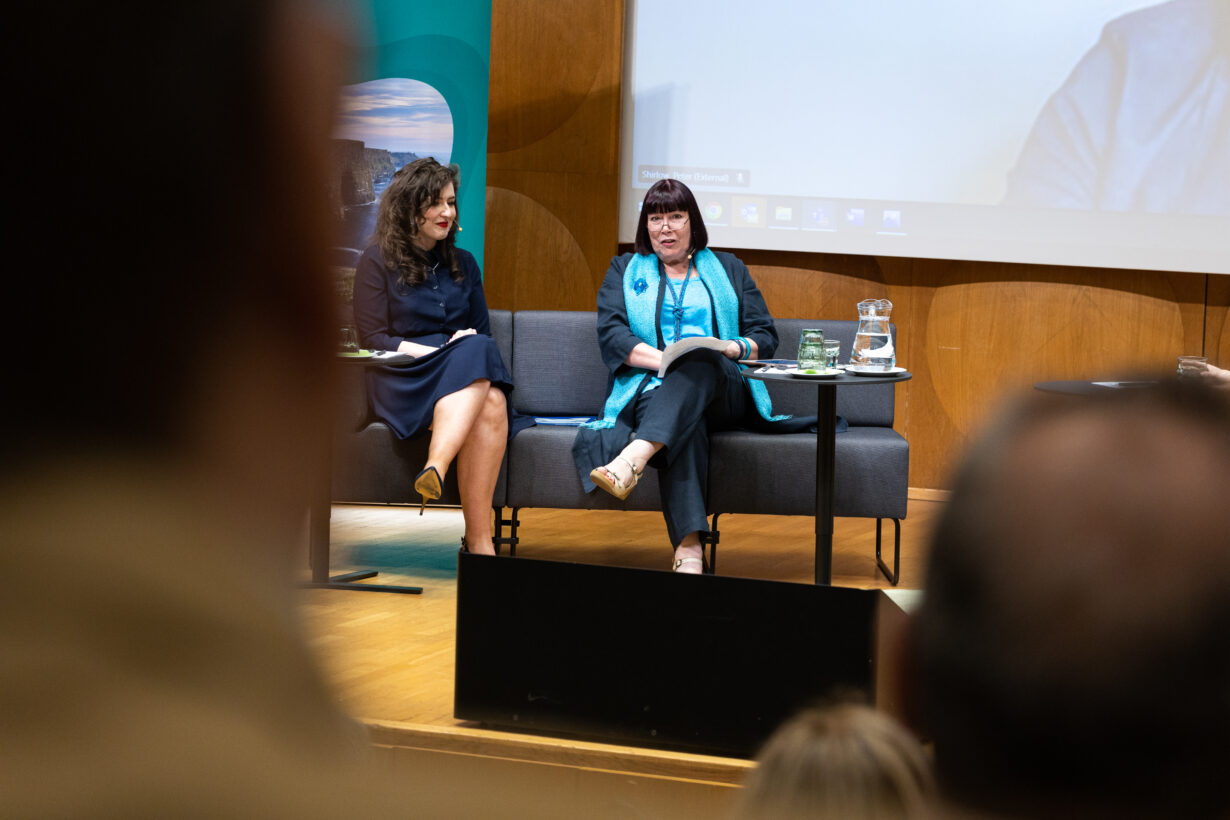
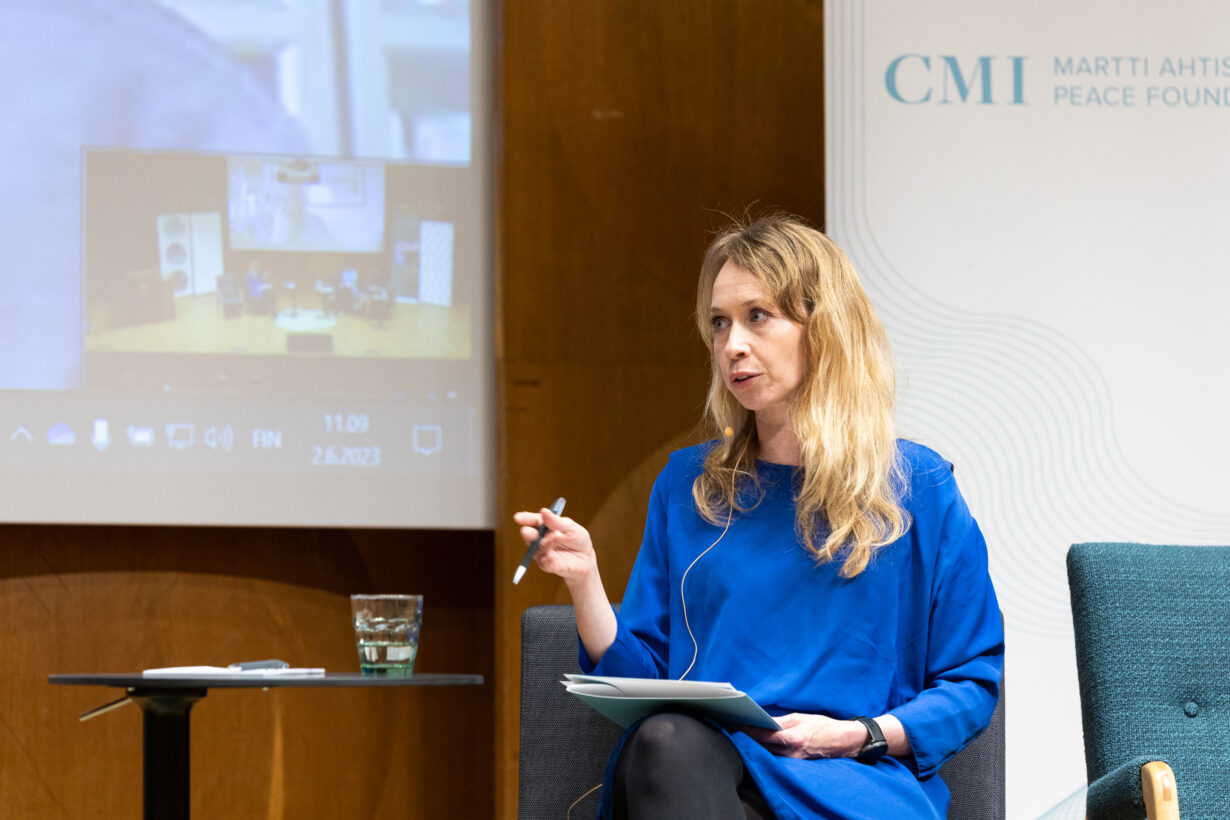
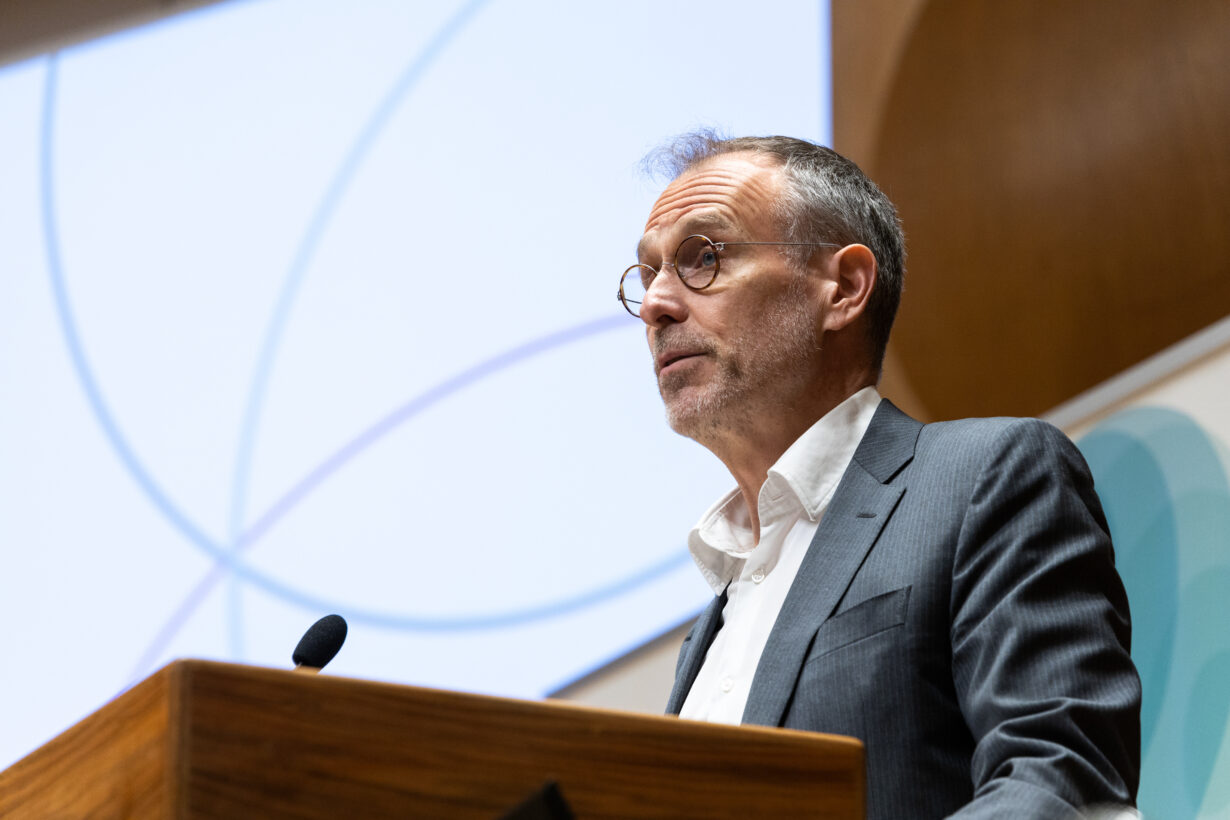

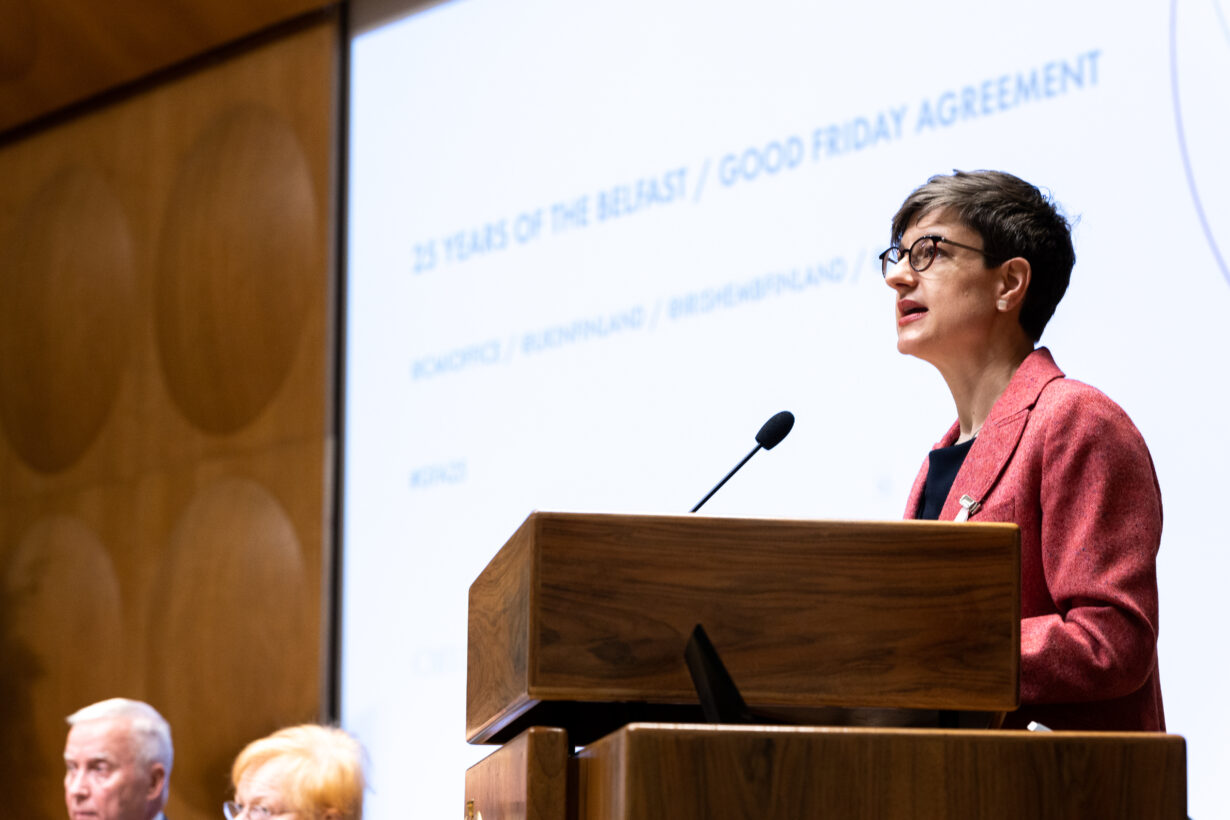
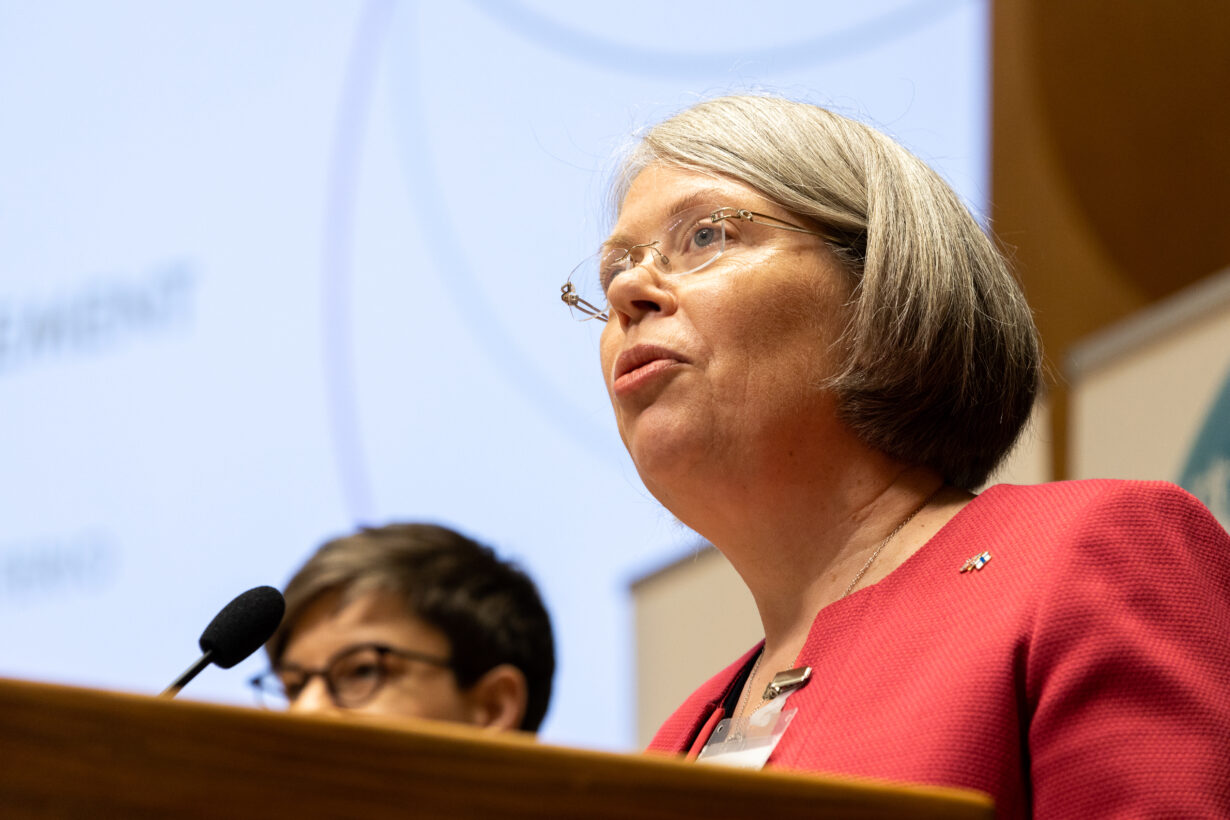
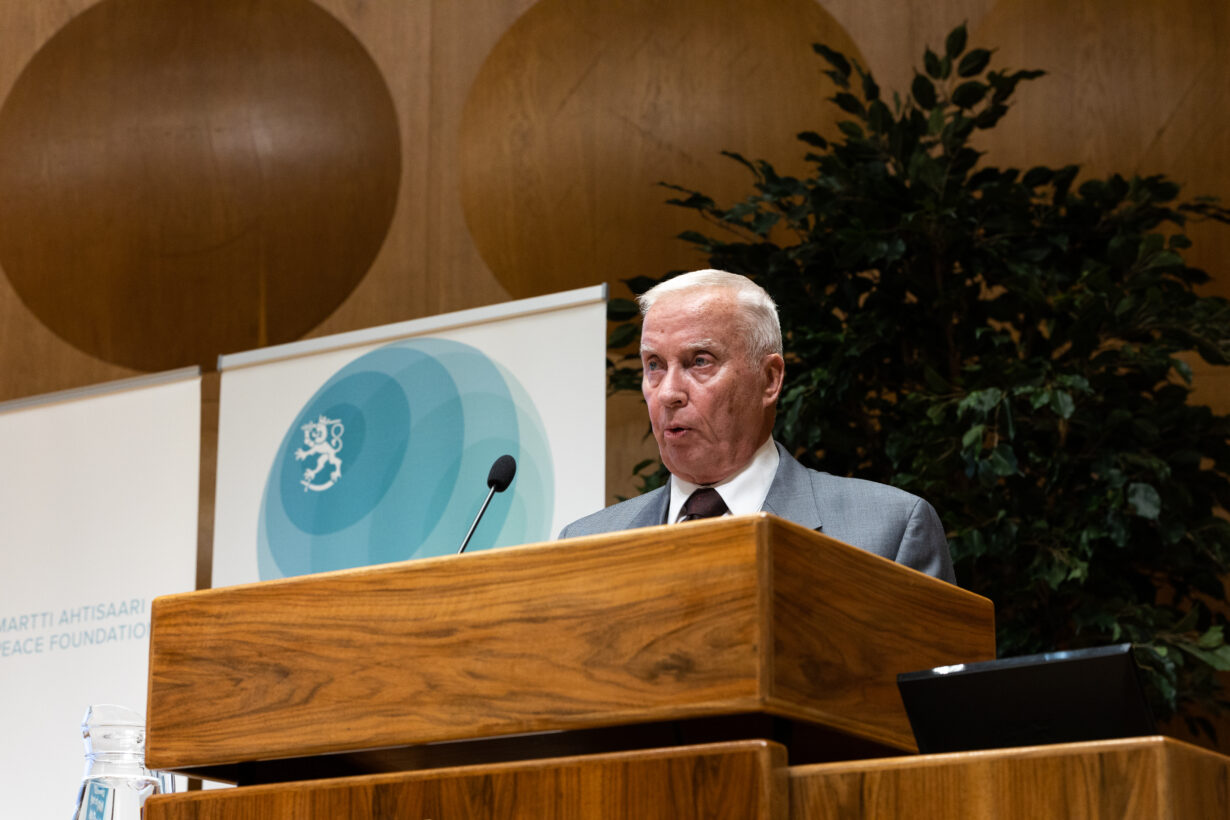

Photos: Maria Santto
“Everything was salvaged, some by the right hands and some by the wrong, but nothing was simply lost.” – Tove Jansson, The Summer Book
The Summer Book, a classic by the Finnish author Tove Jansson, tells the story of Sophia who spends the summer on a small island in the Gulf of Finland with her grandmother. The two enjoy their time on the island but a thread of grief is also woven into the tales of discovery and joy, serving as a reminder that Sophia is on the island because she, at the age of six, lost her mother.
In her reflection at the seminar, Dr Gail McConnell, poet and author based in Queen’s University Belfast referenced Jansson’s story, a link to her own tragic experience at a young age. Dr McConnell lost her father at the age of three when she witnessed his shooting by two gunmen in the garden during the Troubles – an event that she was too young to remember. Dr McConnell writes about her experience and coming to terms with death and its aftermath, in her book The Sun is Open.
“For a long time, I said I lost my father. But as Jansson knows, ‘nothing, and no one, was simply lost’. The dead live on, in memory and ritual and writing. And our work is to salvage what we can of what has been forgotten or lost,” said Dr McConnell at the event in Helsinki.
The Good Friday Agreement ended decades of sectarian violence, known as the Troubles, in Northern Ireland. It has been hailed as a historic achievement that has been seen as an international example of how to work towards sustainable peace. What has been built after the agreement has had a transformative effect on Northern Ireland’s society and economy.
In her keynote speech at the seminar, former Finnish President Tarja Halonen highlighted that the Agreement is an example of how a deeply divisive society can live and govern together. “The peace process has shown us all what can be achieved with collective action”, she said.
Finland had a significant role in the talks which led to the Agreement, and in the wider Northern Ireland Peace Process. Among Finland’s key figures were former President Martti Ahtisaari, Prime Minister Harri Holkeri, and Brigadier General Tauno Nieminen, who in the seminar reflected on his service at the Independent International Commission on Decommissioning (IICD), which was established to oversee the decommissioning of the weapons of paramilitary groups.
Inclusiveness a factor of success
The fact that the Agreement was reached came as a surprise to many. As one of the architects of the Agreement, U.S. Senator George Mitchell has put it, there were 700 days of failure and 1 day of success.
One of the outstanding aspects of the all-party talks leading up to the Agreement was the creation of Women’s Coalition who had to fight for their place at the table and displayed women’s leadership in peace processes already before the Women, Peace and Security Agenda (WPS).
Bronagh Hinds, co-founder of Northern Ireland Women’s Coalition and founder of DemocraShe, participated as a negotiator in the two years of multi-party talks that led to the Agreement.
Hinds believes that the success of the Agreement roots in the design of the peace process and the negotiations that differed from the previous peace negotiations in that they were more inclusive. She highlighted the importance of inclusion also going forward.
“That means women and also civil society. We need to see women in peace making and negotiating the peace. Putting together an implementation plan and providing leadership for moving on needs to come from all the strata of the society”, she stressed.
Professor Peter Shirlow, Director at the University of Liverpool’s Institute of Irish Studies, who has undertaken conflict transformation work in Northern Ireland, acknowledged the importance of political institutions in the success of the Agreement, but emphasised that this was the people’s process, which allowed the creation of civil society.
“90% of the peace has been sustained by the civic sector.”
Dealing with transgenerational trauma
A lively panel discussion led by CMI’s Head of Women in Peacemaking Johanna Poutanen reflected on the legacy and the meaning of the Agreement for different generations in Northern Ireland today, on transgenerational trauma and on the future.
“The Good Friday Agreement gave me a life that my parents never had”, said Tara Grace Connolly, who was born in 1997 and therefore does not personally remember the Troubles.
Yet with bombs and violence gone, there is still much to do to move on from the conflict, as transgenerational trauma lives on in Northern Irish society. One of the symptoms is the high rate of suicide, Connolly explained.
According to Connolly young people are ready to have discussions about the legacy of the conflict, but it is still a topic primarily discussed within the home. She raised the worry over such conversations not reaching the political level.
“You cannot put trauma in a box, put it in a corner and hope that it goes away.”
Connolly, who was Ireland’s first youth delegate to the United Nations from Northern Ireland, explained that young people tend to grab opportunities overseas because of a perceived instability in Northern Ireland due to the legacy of the conflict. According to her it is important to define Northern Ireland’s role in global society.
“25 years later, we are still finding our feet”, she said.
A legacy that serves as an example
Today the Good Friday Agreement and its legacy serve as an inspiration in the field of peace mediation and conflict resolution.
“One of the key elements that made the Agreement and the following process successful was the inclusion of women in negotiations. In the field of peace mediation, we should remember this,” said CMI’s CEO Janne Taalas.
Yet, as President Ahtisaari has said, the real work only starts after peace negotiations have been concluded and when the agreement reached has to be implemented.
“The Good Friday Agreement is and was an extraordinary achievement and at the same time there is still a lot of work to build peace, and to listen to our children and young people, what they tell us about transgenerational trauma”, said McConnell.
“Mediation has a long-time span and it is fraught with risks and uncertainty. It often takes years to reach any results and requires initiatives at many different levels. The need for long-term commitment, and the readiness to engage regardless of uncertainties, are the important lessons learned in Northern Ireland,” said Under Secretary of State Kai Sauer.
Long-term peace processes can also benefit from long-term friends and international partners.
“Northern Ireland has more friends than I ever even realised”, said Tara Grace Connolly after the seminar in Helsinki. “It is quite heartwarming that while at times our problems can seem very ingrained at home, and they feel as though we feel a bit alone, you can go across the world and find people who want so desperately for our peace to succeed. They are invested in our future and willing to help.”
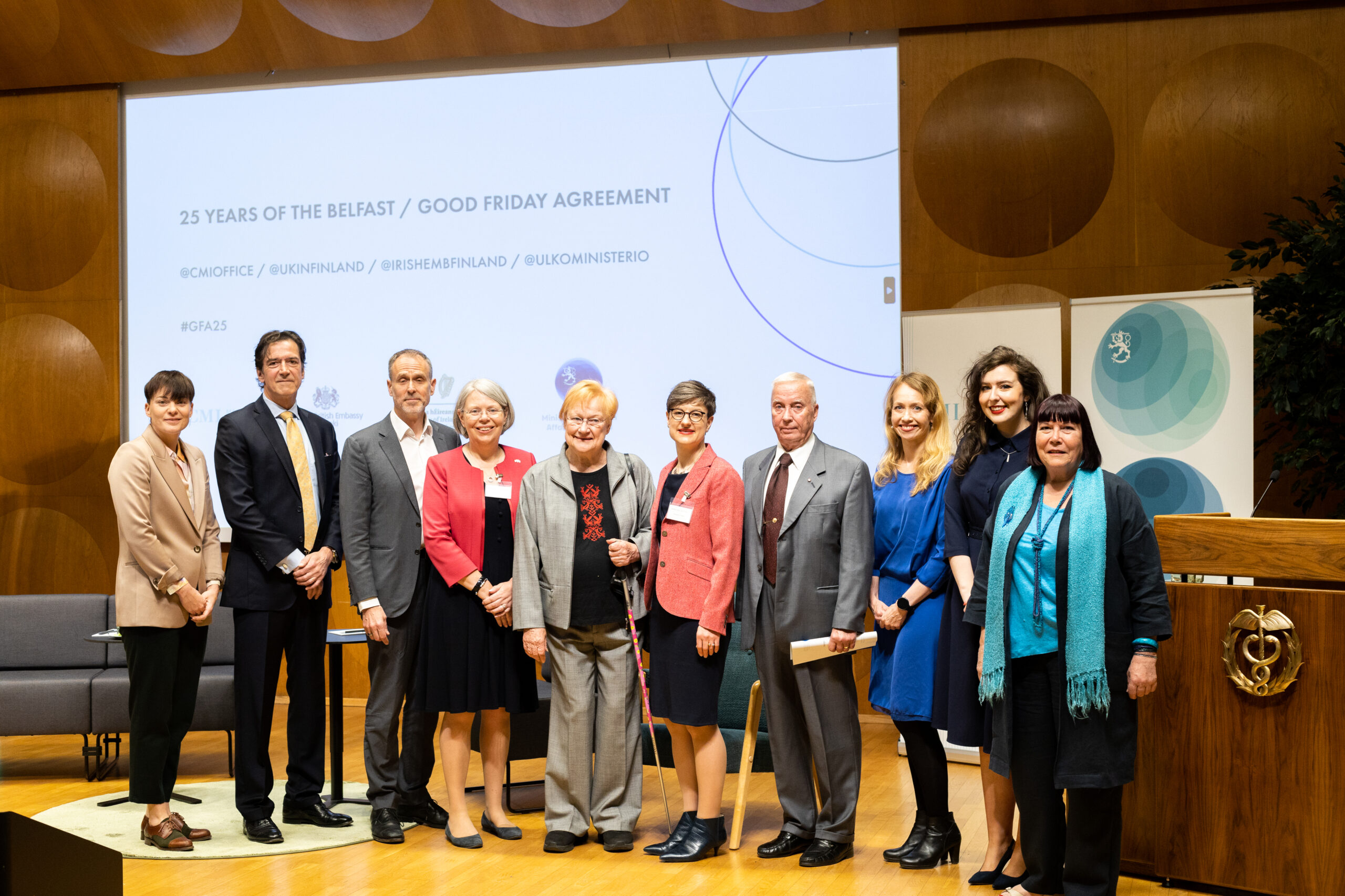
From left to right: Dr Gail McConnell, Under Secretary of State Kai Sauer, CMI’s CEO Janne Taalas, Ambassador Theresa Bubbear, President Tarja Halonen, Ambassador Ruth Parkin, Brigadier General Tauno Nieminen, CMI’s Head of Women and Peacemaking Johanna Poutanen, Ireland’s first youth delegate to the United Nations from Northern Ireland Tara Grace Connolly and Bronagh Hinds, co-founder of Northern Ireland Women’s Coalition and founder of DemocraShe. Photo: Maria Santto
FINLAND AND THE GOOD FRIDAY AGREEMENT
Finland had a significant role in the talks that led to the Belfast/Good Friday Agreement and in the wider Northern Ireland Peace Process. Finland’s former Prime Minister Harri Holkeri worked in a trio chaired by former US Senator George J. Mitchell and also including Canadian General John de Chastelain to move towards talks following the 1994 paramilitary ceasefires in Northern Ireland. They then also co-chaired the Northern Ireland multi-party peace talks.
Former Finnish President Martti Ahtisaari founded the Crisis Management Institute – Martti Ahtisaari Peace Foundation (CMI) in 2000 after his term as Finland’s tenth President. In that same year, he was appointed to inspect IRA weapons dumps, alongside Cyril Ramaphosa, who would later become President of South Africa.
The Independent International Commission on Decommissioning (IICD) was established in 1997 to oversee the decommissioning of the weapons of paramilitary groups, under the Chairmanship of Canadian General John de Chastelain. Brigadier General Tauno Nieminen from Finland and Andrew Sens from the United States of America were the other Commissioners. Brigadier General Nieminen served on the IICD from 1997-2001 and again from 2005-2010. Aaro Suonio from Finland was Chef de Cabinet to the Commission. He and his wife Taina Suonio, who also worked in an administrative role on the Commission, moved with their young family to Belfast in 1997 and remained until 2010. The IICD’s final report was published in 2011.
Over the course of its existence the IICD successfully oversaw the decommissioning of the weapons of the Loyalist Volunteer Force, the Ulster Defence Association and related factions, the Ulster Volunteer Force, the Official Irish Republican Army, the Irish National Liberation Army and, most significantly, the Provisional Irish Republican Army.
Queen’s University Belfast hosts an annual Harri Holkeri Lecture. Speakers have included President Martti Ahtisaari and President Tarja Halonen from Finland and President of Ireland Michael D. Higgins. Former Irish diplomat Dr Anne Anderson delivered the 2023 Harri Holkeri Lecture.